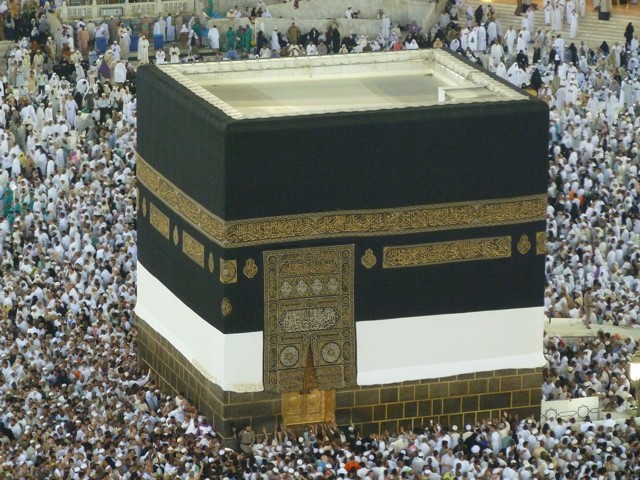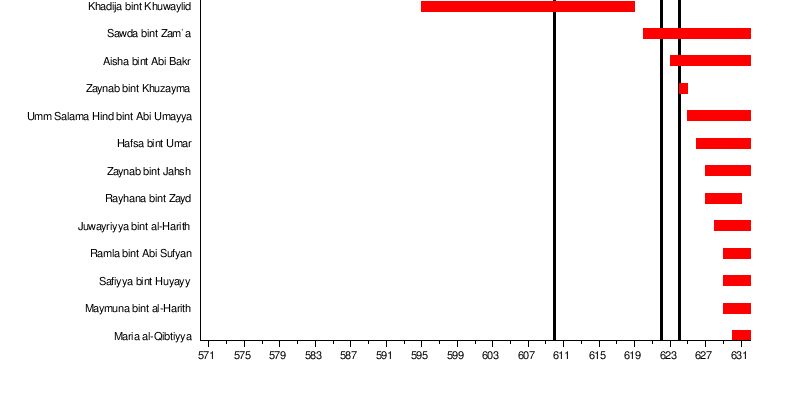| https://al-quran.info/#2:191 |
2:191 And kill them wherever you confront them, and
expel them from where they expelled you, for faithlessness is graver
than killing. But do not fight them near the Holy Mosque unless they
fight you therein; but if they fight you, kill
them; such is the requital of the faithless.
|
| https://al-quran.info/#2:193 |
2:193 Fight them until
faithlessness is no more, and religion becomes [exclusively] for Allah.
Then if they relinquish, there shall be no reprisal except against the
wrongdoers.
|
| https://al-quran.info/#3:28 |
3: 28 The faithful should not
take the faithless for allies instead of the faithful, and whoever does
that Allah will have nothing to do with him, except when you are wary
of them out of caution. Allah warns you to beware of [disobeying] Him,
and toward Allah is the return.
|
| https://al-quran.info/#3:85 |
3:85 Should anyone follow a
religion other than Islam, it shall never be accepted from him, and he
will be among the losers in the Hereafter.
|
| https://al-quran.info/#5:10 |
5:10 As for those who are
faithless and deny Our signs, they shall be the inmates of hell.
|
| https://al-quran.info/#5:33 |
5:33 Indeed the requital of
those who wage war against Allah and His Apostle, and try to cause
corruption on the earth, is that they shall
be slain or crucified, or have their hands and feet cut off from
opposite sides or be banished from the land. That is a disgrace
for them in this world, and in the Hereafter there is a great
punishment for them,
5:34 excepting those who repent before you capture them, and know that
Allah
is all-forgiving, all-merciful.
|
| https://al-quran.info/#8:7 |
8:7 When Allah promised you
[victory over] one of the two companies,
[saying], ‘It is for you,’ you were eager that it should be the one
that was unarmed.1 But Allah desires to confirm the truth with His
words, and to root out the faithless,
|
| https://al-quran.info/#8:12 |
8:12 Then your Lord signaled to
the angels: ‘I am indeed with you; so steady
the faithful. I will cast terror into the hearts of the faithless. So strike their necks, and strike each of their
fingertips!’
|
| https://al-quran.info/#8:17 |
8:17 You did not kill them;
rather it was Allah who killed them; and you did
not throw when you threw,1 rather it was Allah who threw, that He might
test the faithful with a good test from Himself.2 Indeed Allah is
all-hearing, all-knowing.
|
| https://al-quran.info/#8:39 |
8:39 Fight them until
faithlessness1 is no more, and religion becomes
exclusively for Allah. But if they relinquish, Allah indeed sees best
what they do.
|
| https://al-quran.info/#9:3 |
9:3 [This is] an announcement
from Allah and His Apostle to all the people
on the day of the greater ḥajj:1 that Allah and His Apostle repudiate
the polytheists: If you repent2 that is better for you; but if you turn
your backs [on Allah], know that you cannot thwart Allah, and inform
the faithless of a painful punishment
|
| https://al-quran.info/#9:5 |
9:5 Then, when the sacred months
have passed, kill
the polytheists wherever you find them, capture them and besiege them,
and lie in wait for them at every ambush. But if they repent,
and maintain the prayer and give the zakāt, then let them alone. Indeed
Allah is all-forgiving, all-merciful.
|
| https://al-quran.info/#9:14 |
9:14 Make war on them so that
Allah may punish them by your hands and
humiliate them, and help you against them, and heal the hearts of a
faithful folk,
|
| https://al-quran.info/#9:23 |
9:23 O you who have faith! Do
not befriend your fathers and brothers1 if
they prefer faithlessness to faith. Those of you who befriend them —it
is they who are the wrongdoers.
|
| https://al-quran.info/#9:29 |
9:29 Fight those who do not have
faith in Allah nor [believe] in the Last
Day, nor forbid what Allah and His Apostle have forbidden, nor practise
the true religion, from among those who were given the Book, until they
pay the tribute out of hand, degraded.
|
| https://al-quran.info/#9:30 |
9:30 The Jews say, ‘Ezra is the
son of Allah,’ and the Christians say,
‘Christ is the son of Allah.’ That is an opinion that they mouth,
imitating the opinions of the faithless of former times. May Allah
assail them, where do they stray?!
|
| https://al-quran.info/#9:36 |
9:36 Indeed the number of months
with Allah is twelve months in Allah’s
Book, the day when He created the heavens and the earth. Of these, four
are sacred. That is the upright religion. So do not wrong yourselves
during them.1 Fight all the polytheists, just as they fight you all,
and know that Allah is with the Godwary.
|
| https://al-quran.info/#22:8 |
22:8 Among the people are those
who dispute concerning Allah without any
knowledge or guidance, or an enlightening Book,
22:9 turning aside disdainfully to lead [others] astray from the way of
Allah. For such there is disgrace in this world, and on the Day of
Resurrection We will make him taste the punishment of the burning:
|
| https://al-quran.info/#22:19 |
22:19 These two contenders
contend concerning their Lord. As for those who
are faithless, cloaks of fire will be cut out for them, and boiling
water will be poured over their heads,
|
| https://al-quran.info/#22:52 |
25:52 We did not send before you
any apostle or prophet but that when he
recited [the scripture] Satan interjected [something] in his
recitation. Thereat Allah nullifies whatever Satan has interjected,
[and] then Allah confirms His signs, and Allah is All-knowing, All-wise.
|
| https://al-quran.info/#47:4 |
47:4 When you meet the faithless in battle, strike their necks. When you have thoroughly decimated them, bind the captives firmly. Thereafter either oblige them [by
setting them free] or take ransom
till the war lays down its burdens.
That [is Allah’s ordinance], and had Allah wished He could have taken
vengeance on them, but that He may test some of you by means of others.
As for those who were slain in the way of Allah, He will not let their
works go awry.
|
Al-Quran. Online Quranic Project
|

